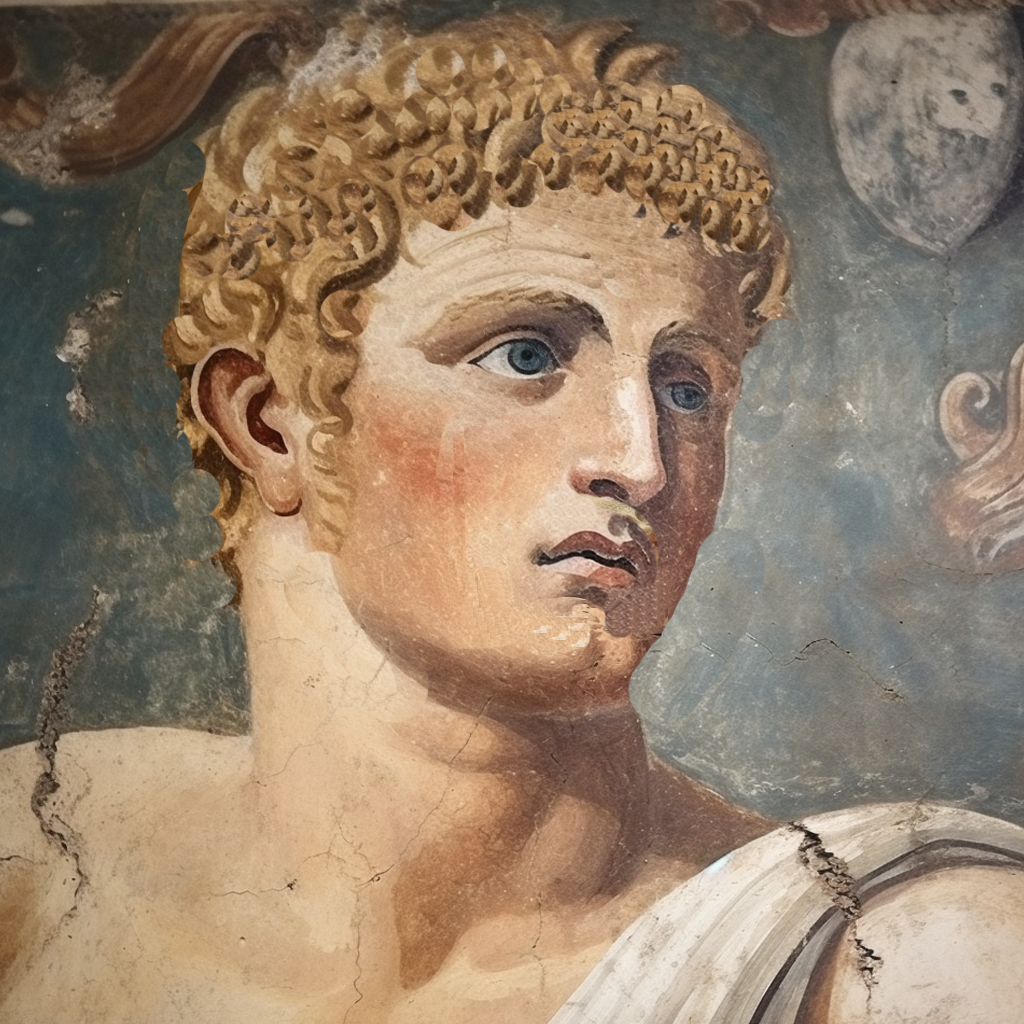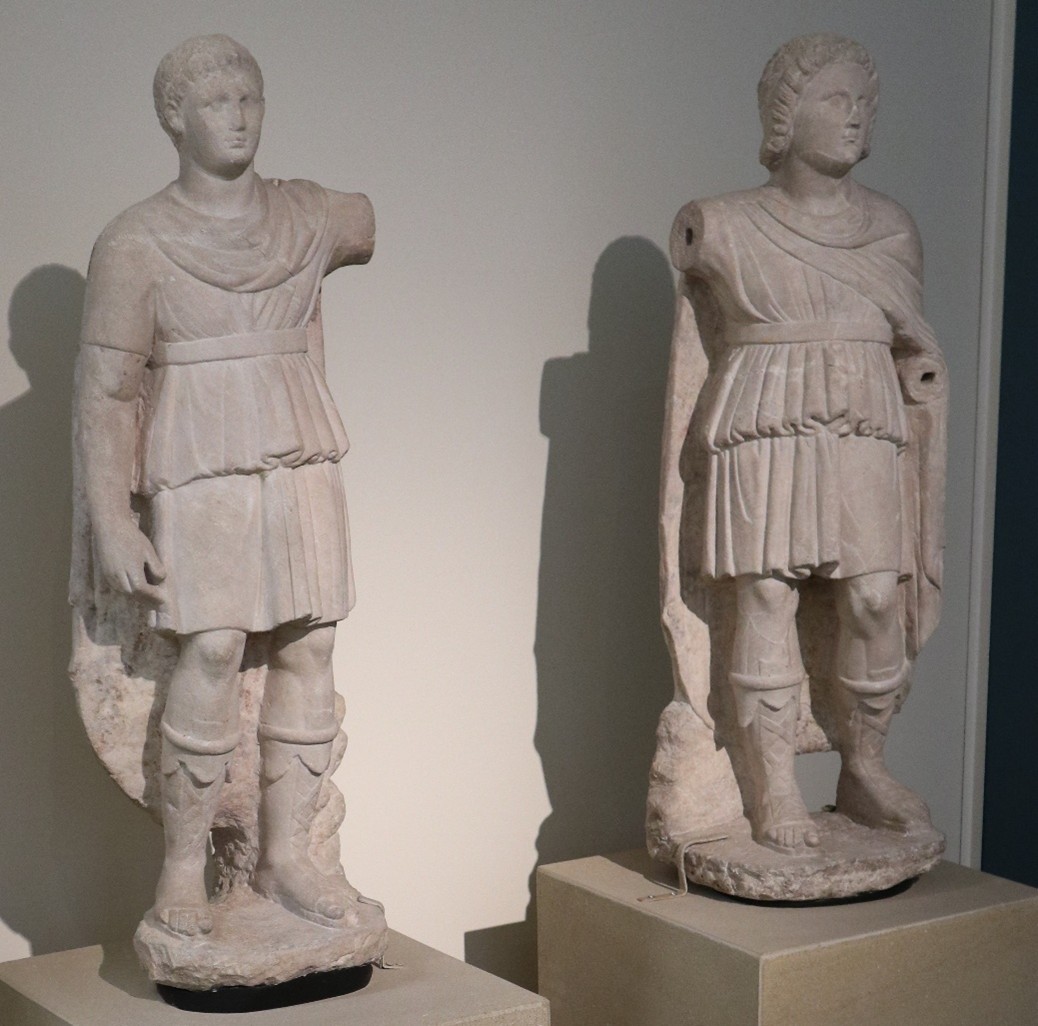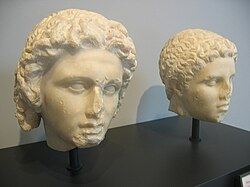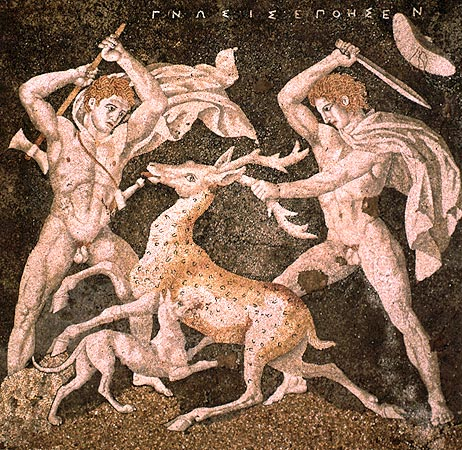Hephaestion
Left Hand of Alexander

Hephaestion is one of the most unforgettable figures in Ancient Greek history. He was the closest friend and most trusted general of Alexander the Great, King of Macedonia.
This article will explore Hephaestion's life historically: his influence on Alexander the Great, his heroic exploits in battle, their inspiring relationship, the importance of loyalty, and the lessons he left behind for those who follow the path.
Born in 354 BC, the junior of Alexander by a year and a half, Hephaestion was a member of the Macedonian aristocracy. As a young man, he was educated alongside the future king as a student of the famous philosopher Aristotle at the informal school of Mieza.
During this period, they worked together on philosophical thought and developed new ideas of military strategy. Hephaestion was not as skilled at broad military command as Alexander or his rival Craterus. However, he had deep knowledge of personal combat (including shock tactics, which he deployed numerous times) and an extremely advanced sense of logistics. These qualities made him the ideal candidate for later roles during the Persian campaign.
Although Hephaestion had a temper of some notoriety, he was also broadly likable and kind, traits that endeared him to Alexander. The young man often relied on Hephaestion to make use of connections that would have been unseemly for the heir to the throne to pursue so openly. Though he could be brutal to the enemies of the king, the cutthroat character common at court was not present in him.

from the 1st century, indicating both received worship as Heroes in that time period
The close friendship between the two was fueled not only by military solidarity but also by a mutual understanding. Their deep affection has been noted by many historians. Part of this was that Hephaestion possessed a certain understanding, absent in other Macedonians, of why Alexander wished to encompass the world and leave a dramatic mark on history. This insight came partly from his knowledge of the occult and general high-mindedness.
Both boys shared in the ideals of the Iliad, especially the model friendship of Achilles and Patroclus, a parallel they reinforced multiple times. Diodorus and Quintus Curtius Rufus indicate that Hephaestion understood the importance of operating within a heroic cultural framework and creating a living example of mythology. Reinforcing this, Plutarch (15.2) recounts that upon landing at Troy, Alexander laid a wreath on Achilles’ tomb, while Hephaestion laid one on Patroclus’.
MILITARY SKILLS
Hephaestion played an important role during Alexander the Great's conquests. He emphasized to Alexander the importance of maintaining supplies and keeping a well-structured, well-fed army. This is one reason the conqueror spent significant time gathering resources in the Levant and Egypt before directly attacking the Persian heartlands. In many stories of Alexander, Hephaestion does not receive credit for these factors, as he was not particularly glory-seeking, though Arrian highlights his competence and pragmatism.

At the Battle of Granicus, he contributed greatly to Alexander's victory by bravely charging into enemy lines and causing disarray among their troops. He also showed strategic leadership at the Battle of Issus, scattering enemy forces.
However, his greatest heroism came during the Battle of Gaugamela, a turning point in Alexander's history. Hephaestion planned the intricate logistics of crossing the Euphrates River and directly attacked the enemy's stronghold, enabling Alexander to realize his broader strategy.
DIPLOMAT OF PERSIA
After the conquest of Persia, Hephaestion was appointed satrap (governor) of the eastern provinces, including the vital region of Babylon. His administrative duties included overseeing these territories and implementing Alexander’s policies, helping to stabilize and integrate the diverse cultures within the conquered lands.
Hephaestion served as a key diplomat during Alexander's campaigns, helping maintain relations with various peoples and tribes. His understanding of different cultures and languages, combined with his flexible and likable nature, contributed to the diplomatic successes of the campaign. These qualities allowed for smoother transitions of power and broader support among the newly conquered populations.
He was also involved in major construction projects, particularly in Babylon. He accompanied Alexander in founding new cities, part of the latter’s vision to blend cultures and promote trade. Hephaestion’s role in urban planning and infrastructure helped shape the environment of these new settlements.
He was not only a great warrior but also a leader who shared Alexander's dreams. Their friendship was deepened by trust on the battlefield. Hephaestion stood out as someone who supported Alexander’s ideals while instilling courage in him. For Hephaestion, victory was not just a military achievement, but the fulfillment of Alexander’s vision. His loyalty and love for his friend were his main motivations, despite occasional criticism from traditionalists who opposed the incorporation of Persian customs.
In Alexander’s campaign to blend elements of Iranian culture, Hephaestion emerged as a supporter of his leadership, a man who understood and encouraged the vision. While many Greeks, such as Callisthenes, criticized Alexander, Hephaestion defended him.
They fought side by side and won great victories. But this relationship transcended military brotherhood. Ancient sources often describe the dramatic intensity of their bond, including episodes where Alexander put his own life in danger to save Hephaestion. This went beyond the expectations of male friendship at the time and illustrates just how vital Hephaestion was to Alexander.
His presence was more than moral support. As a stabilizing force and trusted friend, Hephaestion’s role meant everything to the King of Kings. The king’s affection for him became the foundation of the Companions or Guardians, figures Alexander hoped to make eternal, like the heroes of the Iliad or Odyssey.
AFTERMATH AND LEGACY
The sudden illness and death of Hephaestion was devastating for Alexander. It was not just the loss of a friend, it was the loss of a part of his soul. Alexander built a grand monument in his memory and sought to have him remembered as a God, an equal in divinity. This act stands as proof of his deep affection for his closest companion.
Hephaestion’s death negatively impacted Alexander’s mental state. He became increasingly withdrawn and less approachable, as if his focus turned away from worldly and imperial matters. From that point forward, he was known to engage persistently in rituals for the Gods, changes that also affected his military decisions.
The enduring bond between the two reveals the profound importance of friendship and love in human life.
One of the most meaningful lessons we inherit from their relationship is the role of loyalty in our lives. True friendship is a bond that stays with us in hard times and nourishes the soul. Their saga of overcoming impossible odds to conquer Persia shows the power of commitment, dedication, and loyalty.

Hephaestion is given visual characteristics of his namesake God named Hephaestos, such as his axe
In a world where life, friendship, hardship, and loss are intertwined, loyalty means maintaining our commitment. This not only strengthens our bonds with others, but also uplifts our spirit. Loyalty is a divine and Godly virtue.
The story of Hephaestion and Alexander is more than a historical tale, it is a journey into the emotional depths of humanity. Their relationship reveals the divine power of loyalty and bravery.
These are two of life’s most meaningful elements and symbolize the enduring imprint that individuals leave on each other. What we learn from their story helps us understand how loyalty and friendship shape our lives. And their myth offers a lesson worth remembering each day:
As we face life’s challenges, the loyalty of true friends is a light that illuminates our souls.
BIBLIOGRAPHY
Life of Alexander, Plutarch
Anabasis of Alexander, Arrian
Biblioteca Historica, Diodorus
Alexander Romance
With Alexander in India and Central Asia, Moving East and Back to West, various, edited by Claudia Antonetti, Paolo Biagi
Credit:
Thersthara
[TG] Karnonnos [extra occult information]

 አማርኛ
አማርኛ العربية
العربية বাংলা
বাংলা Български
Български 中文
中文 Čeština
Čeština Dansk
Dansk Deutsch
Deutsch Eesti
Eesti Ελληνικά
Ελληνικά Español
Español Français
Français हिन्दी
हिन्दी Hrvatski
Hrvatski IsiZulu
IsiZulu Italiano
Italiano 日本語
日本語 Kiswahili
Kiswahili Magyar
Magyar Македонски
Македонски नेपाली
नेपाली Nederlands
Nederlands فارسی
فارسی Polski
Polski Português
Português Română
Română Русский
Русский Slovenščina
Slovenščina Suomi
Suomi Svenska
Svenska Tagalog
Tagalog Türkçe
Türkçe